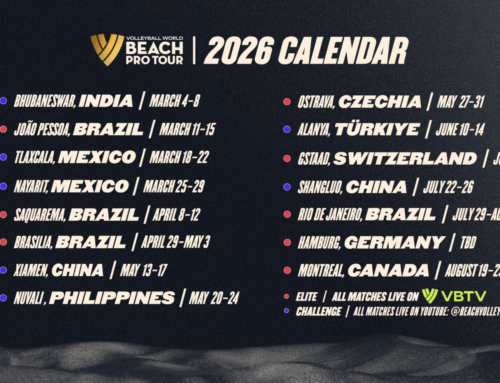HERMOSA BEACH, California — Kylie DeBerg knew the path the lay before her, and it had absolutely nothing to do with playing the sport of volleyball.
That, she’d done long enough. She’d played her first match as a 13-year-old a club team and quickly became one of the most dominant hitters in the nation for Hudson High School. How dominant, you ask? Enough that a kid from a school of just 368 total students from grades seven through 12, from a town of 2,772 people, wound up ranked as the No. 15 recruit in her high school class.
It takes no small deal of success to get noticed from a map dot such as that, and DeBerg enjoyed success and then some, finishing her high school career with more than 1,000 kills and First-Team All-State honors. Illinois noticed, and when her freshman season with the Fighting Illini didn’t feel quite right, she transferred to Missouri, a perfect fit. She thrived, leaving as a three-time All-American, with school records in kills per set and points per set, third in career aces and ninth in career kills.
And that, she thought, was that. Not even 10 years into playing the sport, Kylie DeBerg was finished with it.
“I thought about playing indoor professionally but I just wanted to be done with it and I thought about being a coach and being a [graduate assistant] and getting my masters degree,” she said on SANDCAST: Beach Volleyball with Tri Bourne and Travis Mewhirter. Her coach, Wayne Kreklow, didn’t attempt to dissuade her — he thought she’d be a fine coach — but did ask if DeBerg had her of a young woman named Carly Kan, who graduated from Missouri in 2016 as arguably the greatest player in program history. A Hawaiian, Kan had put her time on the mainland indoors and returned to the islands for her final years of college eligibility on the beach, playing for her home program, the University of Hawaii, before turning pro and becoming the first native Hawaiian to win an AVP.
Had DeBerg, with her year and a half of eligibility remaining, considered that route?
She’d played a little beach in Iowa, mostly over the summers at a league in a local bar with her dad, a tool to have a little fun, yes, but largely to improve her indoor game — “work on passing, work on footwork, work on speed,” she said.
But, she figured, she could do anything for a year and a half, and “if I hate it, I hate it,” she said. That, if need be, would be that. She’d have her master’s degree and get into the coaching career she envisioned.
She probably did hate it, too. Parts of it, anyway. Most elite athletes, after all, don’t particularly enjoy being bad at anything, much less a version of the sport in which they were once considered one of the best in the country. And make no mistake, when she began at LSU, after weighing offers from South Carolina and Stetson, DeBerg was bad.
So bad that, during her fall indoor season, she’d get out on the beach once a week with Russell Brock and the rest of the coaching staff and do nothing but set for an hour. A teammate would watch from the windows from the offices that overlook the courts and “she’d go ‘wow, she sucks at setting,’” DeBerg recalled, laughing. “I was that bad. It’s a different mindset of not being served every time and not getting to hit every time. Indoor I didn’t really talk to my teammates. I was out there and did my job. Beach, it’s just you and your partner.”
And you and every skill. Good as she was indoors, she was, like many indoor players, a specialist at hitting volleyballs. She had never passed or set in wind and rain and heat, something Baton Rouge is certainly not short on. She had never been served short.
It hindered her little.
She started immediately on court two, finishing 33-10. During her final season, she played exclusively on the top court and went 24-12, good enough to be named All-America, with notable wins over UCLA and Florida State. Her success drew the inevitable comparisons to Taryn Kloth, another 6-foot-4 indoor transfer from a world not known for beach who excelled immediately on the sand, becoming an Olympian and one half of arguably the best team in the world with Kristen Nuss. The path that Kloth blazed became the ideal road map for DeBerg to follow, which is all still a bit surreal and near impossible for DeBerg to believe, a 26-year-old from a town smaller than most high schools in California, traveling the world to play a sport she barely knew existed outside of a local bar league and the Olympics.
“Never thought I’d be playing professional. Growing up in Iowa, we have 2,000 people in our town and my grade was 33 people. Never thought I’d be playing professional at any type of level,” she said. “It’s been a wild journey. Even two years ago I never thought I’d be here saying I could go try and qualify for an Olympics and World Championships. It’s been a fun journey and crazy, lots of ups and downs in beach volleyball and sports.”
But she is here. Unquestionably so. She won a Challenge event in Xiamen, China, with another former Tiger in Toni Rodriguez, a partnership few believed could actually work out, with two left-side blockers teaming up. Then again, which is more difficult to believe, that a kid from Hudson, Iowa, would win a gold medal representing the United States in a beach volleyball event in China, or two excellent beach volleyball players simply figuring it out at a high level?
DeBerg has proven crazier things to be possible, though she admits to having enough question marks of her own.
“We were in the main draw [of three Elites in Quintana Roo, Brasilia, and Saqaurema] but went 0-6 in pool play,” she said. “Not winning a pool game in those three Elites was hard, hard mentally, hard volleyball wise: Is this what we should be doing? So many question marks.
“There were doubts before, just ‘What are you doing? Y’all are both left siders, you’re both blockers, Toni went gold, silver, bronze in those last three tournaments as a blocker [in 2024 with Molly Shaw].’ She’s proved herself as a blocker. So there were people questioning her, people questioning us, why are you playing together? We had that talk of we’re just going to take a chance. This year, international is just for experience. Trying not to let any of the outside talk affect us and know we’re going to be good.
“That was the first true tournament of me playing right side. Just trying new things, trying to figure out what would work.”
It’s all still experimental, and, due to no fault of hers or Rodriguez’s, will continue to be an experiment. Just as they were figuring it out as a team, Rodriguez injured her shoulder at an AVP League event in San Diego, sidelining her for the remainder of the year. It sent DeBerg partner shopping again, and she found a similar type of player: Another left-side blocker in Xolani Hodel, who had been enjoying something of a breakout season with Deahna Kraft. They’ll likely debut at the Manhattan Beach Open in August, another experiment, another round of figuring it out, adapting, something at which DeBerg is quickly becoming an expert.
“I want to go to the Olympics and win gold and World Championships and finals and all the rest but the Olympics more than anything else. Everybody is saying I can do this and there are days at practice where I wonder if I’m really good enough,” she said. “It’s a lot of confidence-building and this year has been tough. Confidence isn’t there sometimes and it’s tough. There’s a lot of good players in America. It’s hard.
“Lots of volleyball, lots of unknowns, and that’s what this sport is.”
One thing, however, that is quickly becoming a known: After a wild journey from Iowa to the top of professional beach volleyball, Kylie DeBerg is here to stay.


